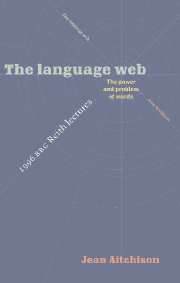4 - A web of words
Remembering words
Published online by Cambridge University Press: 05 June 2012
Summary
We open our mouths and out flow words whose ancestries we do not even know. We are walking lexicons … We carry a museum inside our heads… I find this miraculous. I never cease to wonder at it.
I have put my faith in language – hence the panic when a simple word eludes me… I control the world as long as I can name it.
Penelope Lively Moon Tiger (1987)Dean Farrar, a respected nineteenth-century intellectual, once eavesdropped on some apple-pickers: ‘I once listened for a long time to the conversation of three peasants who were gathering apples among the boughs of an orchard, and as far as I could conjecture, the whole number of words they used did not exceed a hundred’, he guessed. They managed with this low number, he suggested, because ‘the same coarse expletives recurred with a horrible frequency in the place of every single part of speech’. Dean Farrar, like numerous others, apparently grossly underestimated the number of words used and known by native speakers of English.
Words are the topic of this chapter. The language web is the title of this whole book, and the human wordstore with its multitude of links is perhaps the most truly weblike of all aspects of language – even though up till recently, both the size and importance of the internal dictionary, or mental lexicon, have been underestimated.
- Type
- Chapter
- Information
- The Language WebThe Power and Problem of Words - The 1996 BBC Reith Lectures, pp. 61 - 78Publisher: Cambridge University PressPrint publication year: 1996



